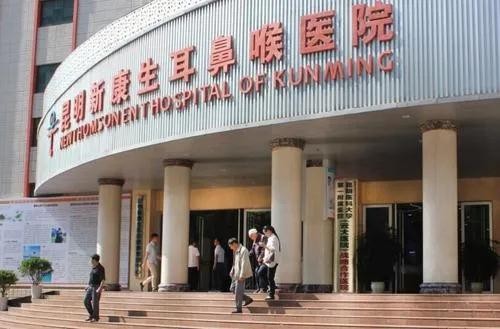Strict medical insurance investigation! Large specialist hos
Release time:2020-04-14 19:37:45Views:
In recent years, the National Medical Insurance Bureau has cracked down on fraud and fraud, and many hospitals have fallen into the legal system. Recently, the Yunnan Medical Security Bureau announced 8 typical cases of fraudulent insurance fraud. Among them, a case of fraudulently obtaining medical insurance fund due to suspected inducement of the insured person is particularly worthy of attention.
Suspected of inducing hospitalization, specialist hospital was fined and closed
According to the report, Kunming Xinkangsheng Otolaryngology Hospital, in the name of carrying out the charity action of "helping the elderly and disability, hearing health", induces and organizes the hospitalization of insured persons through the promotion of free hospitalization and free transportation of patients. According to the relevant regulations, the medical insurance department ordered the refund of the violation fee of 14.7856 million yuan, the deduction of the service quality deposit of 529,300 yuan, the total cost of recovery of 15.3149 million yuan, and the termination of the medical insurance service agreement, closing the medical insurance payment system.

Pictures from the Internet
According to previous reports from the Yunnan Information Daily, Kunming Kangsheng Otolaryngology Hospital was once a large tertiary otolaryngology specialist hospital, which covers an area of 15,000 square meters.
Earlier, according to the information about the hospitalization expenses of the basic medical insurance designated hospitals in the first half of 2018 released by the Kunming Medical Insurance Bureau, Kunming Xinkangsheng Ear, Nose and Throat Hospital had the lowest self-concealment rate of 3.38%.
It can be seen that the hospital relies heavily on medical insurance income.
It is understood that after the medical insurance punishment, the hospital can no longer maintain. An investor from the hospital disclosed to the "Medical Consultation" that the hospital was already in a state of loss, plus the medical insurance punishment, the hospital was bankrupt and liquidated, and the losses were heavy.
It is understood that the Kunming Municipal Health and Health Commission has also issued an announcement regarding the cancellation of Kunming Xinkangsheng Otolaryngology Hospital.
Regarding whether the punishment in this case was reasonable, a senior medical insurance expert told "Medical Care": "The biggest difference between medical services and other services is that the demand side determines the demand. Therefore, as a designated hospital for medical insurance, it is not possible to induce hospitalization by admission Hospitalization to solicit patients is a subjective act of maliciously deceiving medical insurance funds. "
So, how to define the hospital's "induction hospitalization" behavior? According to a report from the medical insurance department, in general, “induction of hospitalization” refers to designated medical institutions recruiting insured persons for hospitalization by means of rebates, medical care, medicines and medicines, free food and accommodation, etc., or adopting improper reduction or exemption of medical expenses and disguised discounts , False propaganda and other means to induce medical insurance participants to be hospitalized and to take out medical insurance funds.
Suspected of inducing medical consumption, many hospitals have been suspended medical insurance agreement
In fact, according to the "Medical Consultation", there are not a few cases similar to those punished in Kunming Hospital.
Recently, Anhui Province also reported a case involving false propaganda and inducement to defraud the insured from being hospitalized.
According to information from Anhui.com, Xingcheng Ningguo Kangjia Hospital was punished for its improper reduction of fees and the use of "free provision of meals" and "arrangement of vehicle pick-up" to induce medical consumption.
The hospital's financial verification results show that Kangjia Hospital has implemented various degrees of preferential relief for the personally paid portion of the discharged patients after medical insurance reimbursement. In 2019, a total of 523 concessions were reduced and a total of 163,300 yuan was reduced. Throughout the year, 270,000 yuan was exempted for inpatient food.
In addition, the hospital also has problems such as poor grasp of the indications for hospitalization, unreasonable medication, unreasonable examination, unreasonable treatment, and unreasonable charges.
To this end, the medical insurance department recovered Ningguo Kangjia Hospital's illegal medical insurance fund 418620.43 yuan; suspended the hospital's medical insurance settlement relationship for 3 months and rectified within a time limit; deducted 6 points and 2 points for two medical insurance doctors.
According to another introduction, relevant medical insurance departments in Hunan Province found through intelligent monitoring systems and special (field) inspections that the number of hospitalized inpatients in the Johnson & Johnson Anorectal Hospital of Yueyang City increased rapidly in a short period of time, and most of the diseases were gastrointestinal polyps and mixed hemorrhoids. The payment amount of the medical insurance fund is the same.
After investigation, the hospital through the "comprehensive large-scale anal and intestinal cancer public welfare health screening activities", medical insurance, free consultation and other methods to enroll the insured personnel in hospital. According to relevant regulations, the medical insurance department refused to pay the fees that did not meet the basic medical insurance system, and suspended the hospital's service agreement for 2 months.
It is understood that the current storm of strict medical insurance investigations and fraudulent frauds continues. Many local medical insurance departments have defined the induction of hospitalization of insured persons as serious violations of the law and regulations, and proposed to focus on remediation of medical institutions through free pick-up and free hospitalization. , Free food and accommodation, etc. to induce serious violations of laws and regulations by insured persons hospitalized.
It can be seen that the relevant case lessons are worthy of reference for the majority of medical institutions.
Reprint please indicate the source: HC3i Digital Medical Network



